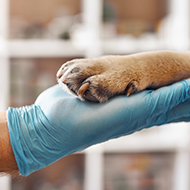The winning topics include an investigation into the circumstances surrounding non-accidental injuries in small animals.
Dogs Trust reveals the recipients of its 2022 funding scheme.
Nine researchers from various UK veterinary institutions have been awarded grants to work on projects that positively impact dog welfare.
Dr Dan O’Neill from the Royal Veterinary College (RVC) and Sean Taylor from the University of Liverpool are among those who have scooped a 2022 Dog's Trust Canine Welfare Grant.
The funding is awarded annually to projects that focus on disease, behaviour or healthy ageing.
This year's winning projects explore an array of important areas, including antibiotic resistance, improving behaviour consults in practice and the circumstances surrounding non-accidental injuries in small animals.
The list of winners and their research topics is as follows:
| Dr Gavin Paterson BSc, PhD, FHEA |
University of Edinburgh |
Bacteriocins as novel tools to tackle canine pyoderma |
| Gina Pinchbeck BVSc |
University of Liverpool |
Understanding and improving behaviour consults in veterinary practice |
| Professor Richard Mellanby BSc BVMS PhD |
Royal (Dick) School of Veterinary Studies |
Tackling antibiotic resistance through the development of point-of-care diagnostics to rationalize antibiotic prescribing |
Professor Eithne Comerford MVB PhD |
University of Liverpool |
Longitudinal assessment of a mobility questionnaire (GenPup-M) in improving diagnosis and early intervention in dogs with, without and at elevated risk of mobility problems. |
| Dr Dan G. O’Neill, MVB BSc(Hons) |
The Royal Veterinary College |
Hot Dogs – Validating the VetCompass Clinical Grading Tool for Heat-related Illness in Dogs
|
Prof Emma SJ Robinson B.Sc., Ph.D |
Bristol University |
Use of long-chained aliphatic aldehydes in ameliorating separation-related anxiety in dogs |
Sean Taylor |
University of Liverpool |
A retrospective study of the mechanisms and circumstances surrounding injuries sustained by Domestic Small Animals with a particular focus on Non-Accidental Injury. |
Dr Stella Mazeri, BVM&S, MSc, PhD |
The Roslin Institute |
Use of portable virus sequencing technology to accelerate rabies elimination in dogs in Sub Saharan Africa
|
| Simone Cutler |
University of Edinburgh |
Investigation of microRNA (miRNA) as biomarkers of chronic hypoxia in brachycephalic dogs |
Paula Boyden, Dogs Trust veterinary director, said: “As well as striving to provide the best possible welfare for the dogs in our own care, Dogs Trust also invests in funding research that aims to improve the lives of dogs for generations to come through its Canine Welfare Grants (CWG) programme. This year the projects, whilst focusing at all times on dog welfare, cover a wide spectrum of important issues and we are excited to see the outcomes.
“As chair of the Links Group, which raises awareness of the link between the abuse of people and the abuse of animals, I will be particularly interested to see the results of Sean Taylor’s retrospective study of the mechanisms and circumstances surrounding injuries sustained by domestic small animals with a focus on non-accidental injury.”








